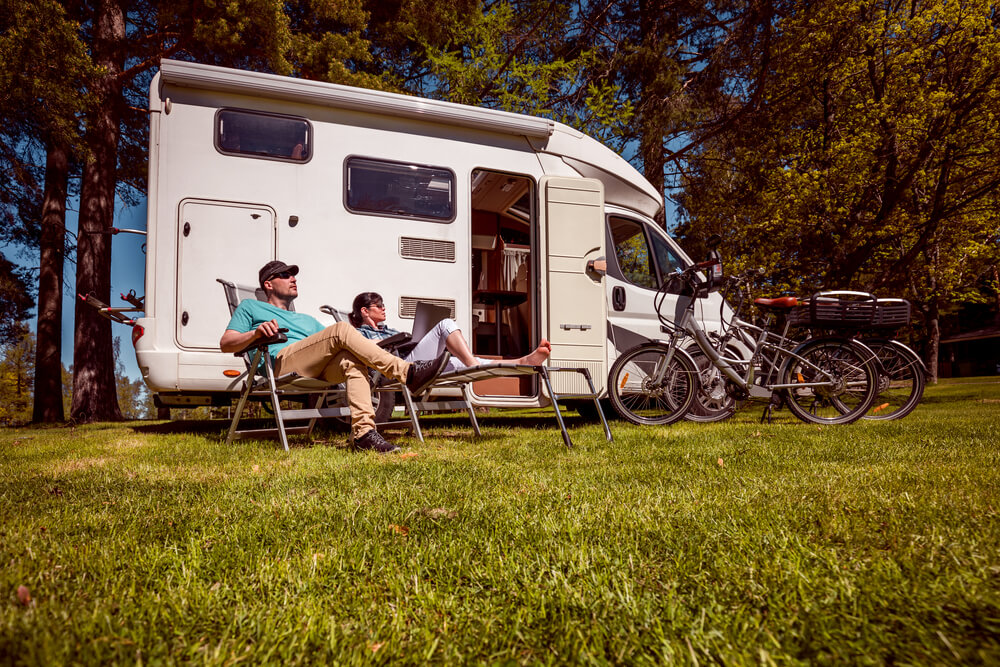RV Buying Tips for First-Time Owners
Contents
No matter who you are, buying an RV is an exciting experience. Whether you’re looking to take weekend trips more often, or you plan on living in your RV full-time, getting the right rig for your needs is essential.
Fortunately, at Kirkland RV, we make it easy for you with a wide selection of high-quality vehicles that will help you travel in style. However, if it’s your first time buying a mobile home, there are several things you should know before you sign on the dotted line.
Living in an RV is thrilling, but it’s much different than staying in a hotel or camping outside. Thus, when buying an RV for the first time, you want to consider these factors.

Size Matters
One of the most significant things to pay attention to when looking at and comparing different mobile homes is the size of the rig. RVs come in a few different classes, so it’s imperative to know the difference between them.
- Class A – these are the largest and most luxurious models. Thus, you have to be careful when driving because they can be long, tall, and wide. If you’re not comfortable driving something like that, it can be more than a little intimidating.
- Class B – on the opposite end are these camper vans. They aren’t much larger than a full-size van, meaning that they’re perfect for weekend getaways. However, their limited size means that these RVs have fewer accommodations.
- Class C – for most RVers, a C-class motorhome is the best choice. These models have just enough amenities to be comfortable in all conditions, but they’re not so large that they’re too much to handle.
Motorhome vs. Trailer
For the most part, many new RV owners want something that they can drive. Typically speaking, a motorhome is going to be a better option because you don’t have to worry about tow hitches or having the right kind of towing vehicle to bring it along.
That being said, having a trailer means that you can park it somewhere and use your truck to go sightseeing or traveling outside of your campground or overnight spot. Also, if you already have a decent-sized truck, buying a mobile trailer may be a smarter and more cost-effective decision.
Walk Through and Inspect the Amenities
It’s one thing to see that your new RV has a bathroom with a shower. However, once you’re inside the rig and you see how compact your shower is, it can be a little shocking at first.
If you’re used to having all of the luxuries of home, then you’ll want to get an RV that suits your preferences. You will have to pay more for a Class A model that comes with all of the accommodations, but you’ll be traveling in style.
Overall, you want to try and experience eafch component of the RV as much as possible. Stand inside the shower to see if it feels cramped. Sit in the driver’s seat. Lay down on the bed. Testing everything will give you a better sense of what to expect, and it will ensure that you make the right decision.
Don’t assume that you’ll adjust to something unless you’ve tried it first. You don’t want to figure out that you need more space on the first night you spend in your new RV.
Buying Used vs. New
For many people, buying a used car or truck makes a lot of sense. These vehicles are built to last a long time, so why not save money by getting something that has already been driven?
With an RV, however, used means that each part of your mobile home has had someone else in it. For some people, a used RV is less desirable because each amenity has already been utilized, which can make it feel less special (especially if it’s your first mobile home).
For others, however, used RVs are a much better investment. Not only will you save money compared to a new model, but you know that everything works well since someone else has already broken it in.
Maintenance and Upkeep
Since your RV is going to be your home and your transportation—assuming you buy a motorhome, you have to do a lot of things to keep it running smoothly. Thus, when comparing different models, make sure that you understand what it takes to handle the various systems included in your RV.
Pay attention to things like:
- Power needs for various electrical components
- Waste and fresh water tank sizes
- Onboard generator vs. plug and battery
- Stoves and cooktops
Remember that you have to provide all of the fuel, water, and power for your RV. While you can usually get these things from different overnight spots (like campsites), you will want to familiarize yourself with these various processes. For example, how easy is it to empty and clean your gray and black water tanks? How many amps of power do you need to have access to at any given time?
Bottom Line – Let Kirkland RV Help
We know RVs, so let our experienced and knowledgeable staff help you with your decision. We understand the various elements you need to know about your new RV, which means that you’ll be better prepared for life on the road. Contact us today to get started and browse our extensive collection of vehicles.

